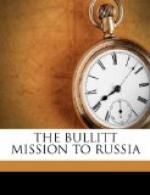FOOD
Everyone is hungry in Moscow and Petrograd, including the people’s commissaries themselves. The daily ration of Lenin and the other commissaries is the same as that of a soldier in the army or of a workman at hard labor. In the hotel which is reserved for Government officials the menu is the following: Breakfast—A quarter to half a pound of black bread, which must last all day, and tea without sugar. Dinner—A good soup, a small piece of fish, for which occasionally a diminutive piece of meat is substituted, a vegetable, either a potato or a bit of cabbage, more tea without sugar. Supper—What remains of the morning ration of bread and more tea without sugar.
Occasionally sugar, butter, and chickens slip through from the Ukraine and are sold secretly at atrocious prices—butter, for example, at 140 roubles a pound. Whenever the Government is able to get its hands on any such “luxuries” it turns them over to the schools, where an attempt is made to give every child a good dinner every day.
The food situation has been slightly improved by the rejoining of Ukraine to Great Russia, for food is relatively plentiful in the south; but no great improvement in the situation is possible because of the lack of transport.
MANAGEMENT
Such supplies as are available in Soviet Russia are being utilized with considerable skill. For example, in spite of the necessity of firing with wood, the Moscow-Petrograd express keeps up to its schedule, and on both occasions when I made the trip it took but 13 hours, compared to the 12 hours of prewar days.
The food control works well, so that there is no abundance alongside of famine. Powerful and weak alike endure about the same degree of starvation.
The Soviet Government has made great efforts to persuade industrial managers and technical experts of the old regime to enter its service. Many very prominent men have done so. And the Soviet Government pays them as high as $45,000 a year for their services, although Lenin gets but $1,800 a year. This very anomalous situation arises from the principle that any believing communist must adhere to the scale of wages established by the government, but if the government considers it necessary to have the assistance of any anticommunist, it is permitted to pay him as much as he demands.
All meetings of workmen during work hours have been prohibited, with the result that the loafing which was so fatal during the Kerensky regime has been overcome and discipline has been restored in the factories as in the army.




